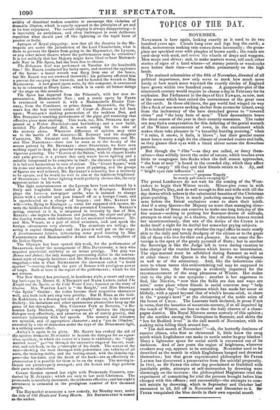TOPICS OF THE DAY.
NOVEMBER..
NOVEMBER is here again, looking exactly as it used to do two hundred years ago. Clouds hang over and fogs bug the earth ; a thick, monotonous soaking rain comes down incessantly • the grass- plats are speckled over with pimples of brown earth ; the roads are yard-deep with mud, and arrest the wheels of drays and waggons. Men mope and shiver ; and, to make matters worse, tell each other stories of signs of a hard winter—of stormy petrels or woodcocks seen before their time—of snow fallen prematurely on the high lands.
The maimed solemnities of the fifth of November, divested of all political importance, now only serve to mark how much more hardy or how much more wayward the courtly circles of England have grown within two hundred years. A gunpowder-plot of the nineteenth century would require to choose a day in February for its explosion. But Parliament in the days of Guy FAWKES' as now, met at the season which best suited the convenience of the great ones of the earth. In those old times, the gay world had winged its way like a flock of sea-mews seeking shelter from storms far inland, away from the inclemency of the bare drenched groves to "towered cities" and "the busy hum of men." Their descendants brave the dead season of the year in their country-mansions. The ruder sex may find a compensation for this deferring of the genial warmth of the Winter amusements of town, in the excitement which makes them take pleasure in "a beautiful hunting morning," when " it rains, it snows, it hails, it blows " ; but their gentler mates must heave many a sigh for the climate of crowded routes and balls, as they glance their eyes with a timid shiver across the flowerless parterre.
But though the "elite "—as they are called, or fancy them- selves—thus wilfully invert the order of nature, which teaches even birds to congregate into flocks when the dull season approaches, "the hum of men" is heard in the crowded city, which they affect to call " empty" till they and their friends return to it. Ay, and " bright eyes rain influence"; and
"gorgeous Tragedy In stately pall comes sweeping by."
The proud Londoners do not wait for the coming of the West- enders to begin their Winter revels. Mince-pies come in with Lord Mayor's Day, and do well enough to flirt and trifle with till the day dawns which ushers in the substantial beauties of the Christmas plum-pudding. There is much junketing among the hearty citi- zens before the finical exclusives come to share their mirth. And if a stray Queen—for Majesty no more than managing direc- tors or heads of firms can contrive to make one long holyday of the fine season—seeking to prolong her Summer-dream of solitude, attempts to steal incog. to a theatre, the robustious knaves remind her unceremoniously, that one of the duties of the Crown is to. make itself a sight for its dutiful but somewhat prying subjects. It is indeed not easy to say whether the regal office be more nearly akin to the daily and termly drudgery of the citizen or to the gayer life of those who live for their own pleasure. In one sense the So- vereign is the apex of the gaudy pyramid of State ; but in another the Sovereign is like the Judge left in town during vacation to take charge of the routine business which knows no intermission. The sign-manual must be adhibited during Summer as well as at other times: the Queen is the head of the working-classes as well as of the aristocracy. And, like the industrious citi- zens to whose tastes this unintermitting toil may be supposed to assimilate hers, the Sovereign is evidently impatient for the recommencement of the snug pleasures of Winter. Her stolen visit to the play is one symptom : another is her eagerness to find, like IVInaos, "now that the fields are dun and ways are mire," some place where friends in social converse may help waste a sullen day "—the eagerness which has made her scour so blithely, with a speed beyond that of witch's broom-stick, to share in the " gossip's bowl" at the christening of the noble scion of the house of CECIL. The Laureate hath declared, in prose if not in verse, that the beauties of mountain-scenery, if at all impaired by the touch of Winter' are less so than the leafy charms of a cham- pagne district. His Royal Mistress seems scarcely of this opinion ; for she rambles among the Grampians in Summer, and skirts the "low fat Bedford level" in the dull month of November, with its soaking rains falling thick around her.
"The dull month of November !"—ah, the butterfly denizens of sunnier climes, who first so christened it, little know the snug mirth which Englishmen can make to nestle under its gray blanket I Many a lightsome space for social mirth is excavated out of its darkness. And of late years the region of brightness, whatever croakers may say, appears to be extending. November used to be described as the month in which Englishmen hanged and drowned themselves ; but that great experimental philosopher Sir PETER LAURIE has discovered a preservative from the suicidal propensity. In 1841, as Sir PETER the other day proclaimed at Guildhall with justifiable pride, attempts at self-destruction by drowning were alarmingly on the increase : the philosophical Magistrate tried the experiment of committing for trial the persons brought before him charged with this offence ; and successfully—the attempts to com- mit suicide by drowning, which in September and October had amounted to 23, fell off in November and December to 2. Sir- PETER vanquished the blue devils in their own especial month


























 Previous page
Previous page